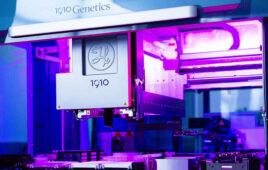Researchers at the University of North Carolina at Chapel Hill have shown that disruption of the circadian clock – the internal time-keeping mechanism that keeps the body running on a 24-hour cycle – can slow the progression of cancer.
The study disputes some of the most recent research in the field indicating that alteration of this daily cycle predisposes humans and mice to cancer. The UNC researchers found that genetically altering one of four essential clock genes actually suppressed cancer growth in a mouse model commonly used to investigate cancer. The findings could enable clinicians to reset the internal clock of each cancer cell to render it more vulnerable to attack with chemotherapeutic drugs.
‘Adjusting the clock in this way could certainly be a new target for cancer treatment,’ said senior study author Aziz Sancar, M.D., Ph.D., a member of the UNC Lineberger Comprehensive Cancer Center and Sarah Graham Kenan Professor of Biochemistry and Biophysics in the UNC School of Medicine.
‘Our study indicates that interfering with the function of these clock genes in cancer tissue may be an effective way to kill cancer cells and could be a way to improve upon traditional chemotherapy,’ Sancar said.
Previous research has shown that the disruption of the body’s natural circadian rhythms affects people’s health. One of the largest epidemiological studies ever performed, the Nurses’ Health Study, found that nurses who worked the night shift had a higher incidence of breast cancer than those who worked days. Another study of flight attendants whose internal biological clocks had been wrecked by travel on transatlantic flights produced similar findings.
Yet when scientists, including Sancar, began to tinker with the molecular mechanisms within the internal clocks of animal models, they did not always see such an effect. Circadian rhythms in humans and in mice are controlled by clock genes, four of which are absolutely essential. In a study four years ago, Sancar found that deleting the clock gene cryptochrome in mice did not increase the incidence of cancer as had previously been expected.
While altering the clock gene did not cause cancer in otherwise normal mice, Sancar and his colleagues wanted to see if it would accelerate the development of tumors in a mouse model that is already predisposed to cancer. Therefore, in this study they modified the cryptochrome gene in mice that also had defects in a gene called P53, which is mutated in nearly half of human cancers. The researchers found that disturbing the internal clock in these mice did not speed up the onset of cancer, but instead had the opposite effect – it extended their lives by 50 percent.
The researchers then wanted to know how interfering with the cryptochrome gene had reduced the incidence of cancer. By closely examining the series of biological events in the disease’s development, they determined that the mutation of this clock gene reactivates the intracellular signals that can eliminate cancerous cells. Sancar said this tactic essentially makes cancer cells more likely to commit cell suicide – through a process known as apoptosis – in response to the stresses of UV radiation or chemotherapy.
‘These results suggest that altering the function of this clock gene, at least in the 50 percent of human cancers associated with p53 mutations, may slow the progression of cancer,’ Sancar said. ‘In combination with other approaches to cancer treatment, this method may one day be used to increase the success rate of remission.’
Release Date: February 3, 2009
Source: University of North Carolina School of Medicine
Filed Under: Genomics/Proteomics




